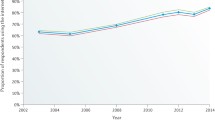Abstract
The normative dimensions of Internet use among patients and their families have not been studied in much depth in the field of clinical ethics. This study considers cancer-related Internet use among families and friends of cancer patients, and how that use of the Internet may affect patients and patient care. Interviews were conducted with 120 cancer patients, most of whom (76%) reported that family, friends, and others in their social network used the Internet in some way related to the patient’s cancer. Many patients (73%) did not request this online help from their social networks, yet found it helpful and comforting nonetheless. Other patients were less positive about the helpfulness of the online efforts of friends and relatives. A significant proportion of patients (39%) also felt that the online information they received was prescreened or edited in some way. Very few patients recalled that their clinicians ever discussed these and other issues with them. The study illustrates that indirect Internet use is a central feature of the cancer experience. In contrast to other literature in this area, the study suggests that indirect Internet use may have normatively positive and negative implications for patients. These implications point towards the importance of studying and understanding indirect Internet use—and Internet use in general—in the field of clinical ethics.
Similar content being viewed by others
References
Ammenwerth, E., and N. Shaw. 2005. Bad health informatics can kill–is evaluation the answer? Methods of Information in Medicine 44 (1): 1–3.
Aroskar, M. 1980. Anatomy of an ethical dilemma: The theory. American Journal of Nursing 80 (4): 661–663.
Bass, S. et al. 2006. Relationship of Internet health information use with patient behavior and self-efficacy: Experiences of newly diagnosed cancer patients who contact the National Cancer Institute’s cancer information service. Journal of Health Communication 22 (3): 219–236.
Bauer, K. 2002. Using the Internet to empower patients and to develop partnerships with clinicians. World Hospitals and Health Services 38 (2): 2–10.
Dyer, K.A. 2001. Ethical challenges of medicine and health on the Internet: A review. Journal of Medical Internet Research 3 (2): e23.
Evans, R. et al. 2004. Making interactive decision support for patients a reality. Informatics in Primary Care 12 (2): 109–113.
Eysenbach, G. 2003. The impact of the Internet on cancer outcomes. CA: A Cancer Journal for Clinicians 53 (6): 356–371.
Franzen, A. 2000. Does the Internet make us lonely? European Sociological Review 16 (4): 427–438.
Helft, P. et al. 2003. American oncologists’ views of Internet use by cancer patients: A mail survey of American Society of Clinical Oncology members. Journal of Clinical Oncology 21 (5): 942–947.
Kirschning, S. et al. 2006. Internet use by the families of cancer patients—help for disease management? Journal of Public Health 15 (1): 23–28.
Nie, N., and D. Hillygus. 2002. The impact of Internet use on sociability: Time-diary findings. IT & Society 1 (1): 1–20.
Paasche-Orlow, M., and D. Roter. 2003. The communication patterns of internal medicine and family practice physicians. Journal of the American Board of Family Practice 16 (6): 485–493.
Parker, M., and J. Gray. 2001. What is the role of clinical ethics support in the era of e-medicine? Journal of Medical Ethics 27: i33–35.
Robinson, T.N. et al. 1998. An evidence-based approach to interactive health communication: A challenge to medicine in the information age. JAMA 280 (14): 1264–1269.
Spooner, T. 2003. Internet use by region in the United States. Retrieved 11/4/2007, from http://www.pewinternet.org/pdfs/PIP_Regional_Report_Aug_2003.pdf.
Acknowledgments
This study is part of a larger project being conducted with the support of a National Cancer Institute (NCI/NIH) Career Development Award (CA108457) and an American Cancer Society Institutional Research Grant (IRG-91-022-12).
Author information
Authors and Affiliations
Corresponding author
Rights and permissions
About this article
Cite this article
Simon, C., Schramm, S. Cancer and the computerized family: towards a clinical ethics of “indirect” Internet use. Med Health Care and Philos 11, 337–341 (2008). https://doi.org/10.1007/s11019-008-9127-1
Received:
Accepted:
Published:
Issue Date:
DOI: https://doi.org/10.1007/s11019-008-9127-1




